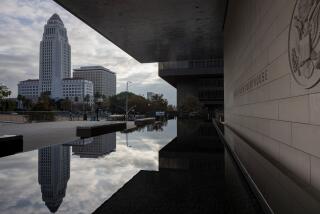Firm Charged With Selling Defective Bolts to NASA
- Share via
A Simi Valley aerospace firm and its two top executives have been indicted by a federal grand jury on charges of selling substandard and defective bolts that were later installed in the space shuttle Discovery, federal authorities announced Thursday.
The bolts did not endanger the lives of the astronauts, officials said.
The indictment accused Darrell Lee, president of Lee Aerospace Products Inc., and Vice President Jerry Martin of falsifying records to show that the bolts met federal aerospace safety standards. The company and the two men face a total of 34 counts of mail fraud and filing false statements.
If convicted, Lee and Martin could be sentenced to 170 years in prison and fined up to $8.5 million. The company could be fined up to $17 million and lose the right to sell to the government.
Martin and Lee, through a secretary, declined to speak with reporters.
The indictment, handed down Wednesday, was announced Thursday in Orlando, Fla., by U.S. Atty. Robert W. Genzman and NASA Assistant Inspector General William Hager. The indictment was released in Orlando because NASA conducted the bulk of its investigation in Florida.
Genzman, in a telephone interview, called the indictment a warning to other firms tempted to defraud the government. “In manned space flight, we cannot afford to let manufacturers decide to take shortcuts,” Genzman said.
Genzman said Lee Aerospace sold the bolts to USBI Production Co. in Cape Canaveral between August, 1985, and September, 1987. NASA investigators said two solid rocket boosters on the space shuttle Discovery contain 1,209 bolts from Lee Aerospace. About 15% of the bolts sampled failed some safety tests, investigators said.
In one instance, 3/8-inch bolts required to withstand 17,000 pounds of pressure per square inch failed at 15,000 pounds per square inch, investigators said. The Discovery has made six flights, the most recent one landing at Edwards Air Force Base last Oct. 3.
But engineers with the National Aeronautics and Space Administration said the bolts, often used to secure cables or electrical boxes, were not installed in critical areas and posed no threat to shuttle crews. Officials said some of the bolts were replaced but most would be allowed to remain.
NASA Inspector General Bill Colvin, in a telephone interview from Washington, called the proliferation of substandard nuts and bolts a major problem. “It’s an industry cancer,” he said. “It’s not just a few firms.”
In addition to the NASA investigation, the Defense Department, Nuclear Regulatory Commission and Navy launched a nationwide crusade to crack down on the suppliers of inferior or counterfeit parts used in nuclear plants, military jets, missiles and commercial aircraft.
Lee Aerospace is the third Los Angeles area firm indicted since last September on charges of falsifying documents to pass off nuts and bolts that didn’t meet federal safety standards.
A control manager for one of those firms, Gary Davidson of Saugus, pleaded guilty to conspiracy and making false statements in March and is scheduled to be sentenced June 9 in U.S. District Court in San Jose. Davidson, 37, worked at Lawrence Engineering and Supply in Burbank.
Davidson could be sentenced to 10 years in prison and fined $500,000, Colvin said. Davidson agreed to help investigators prosecute Lawrence, which was indicted on 33 charges of making false statements and conspiracy, he said. Lawrence and Ramon Smith, the company’s former general manager and vice president, have pleaded not guilty to the charges.
A federal judge ordered Arthur O. Sammons, 76, of Canoga Park to get out of the aerospace fastener business last December after Sammons pleaded guilty to 43 counts of fraud and making false statements.
Sammons operated a parts business out of his garage and sold bolts installed in a NASA space lab. Sammons was fined $62,150 and ordered to pay back $34,500 the space agency paid for the bolts. NASA officials estimated that it will cost $1 million to remove the substandard fasteners from the lab.
More to Read
Inside the business of entertainment
The Wide Shot brings you news, analysis and insights on everything from streaming wars to production — and what it all means for the future.
You may occasionally receive promotional content from the Los Angeles Times.









